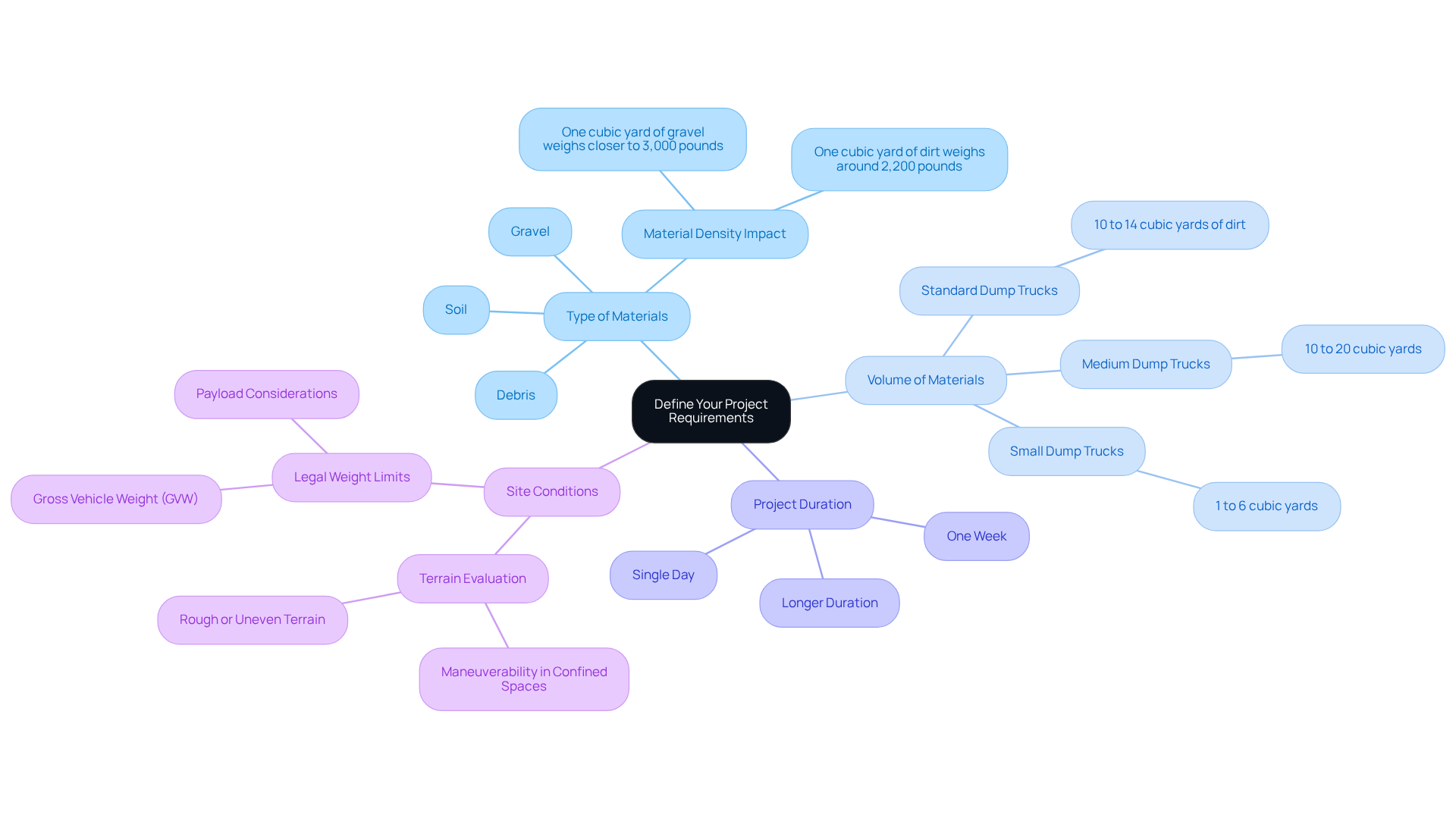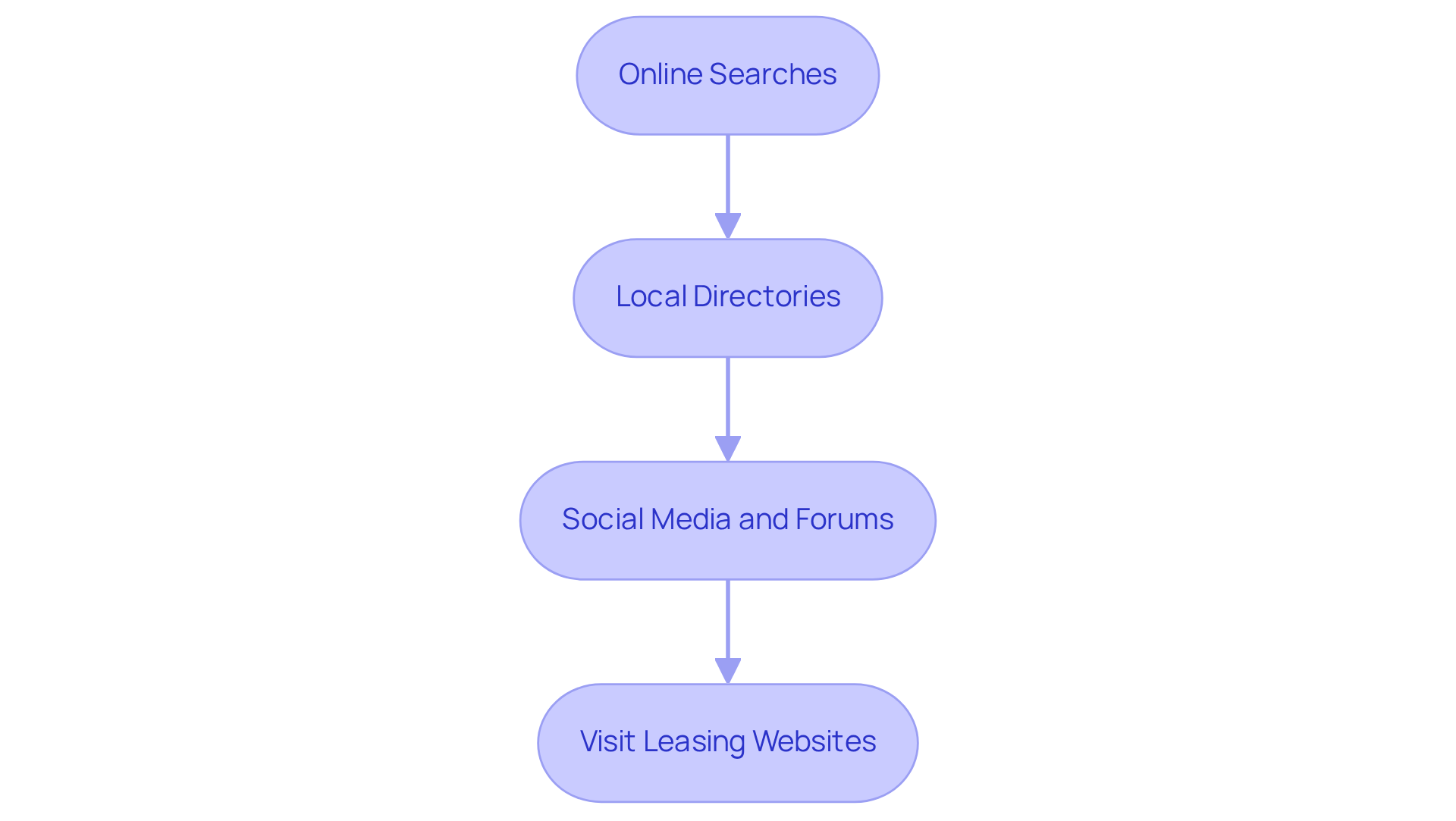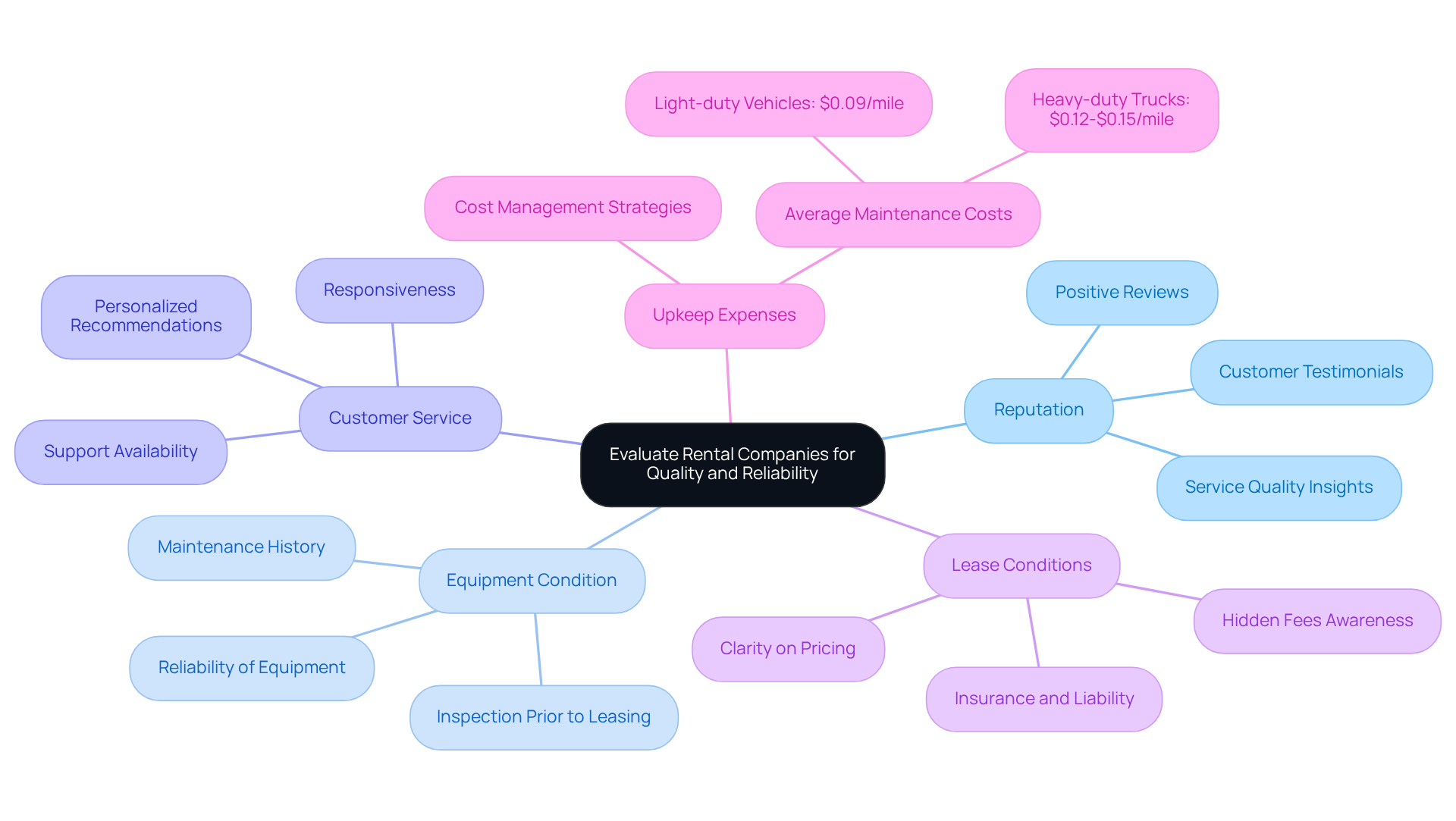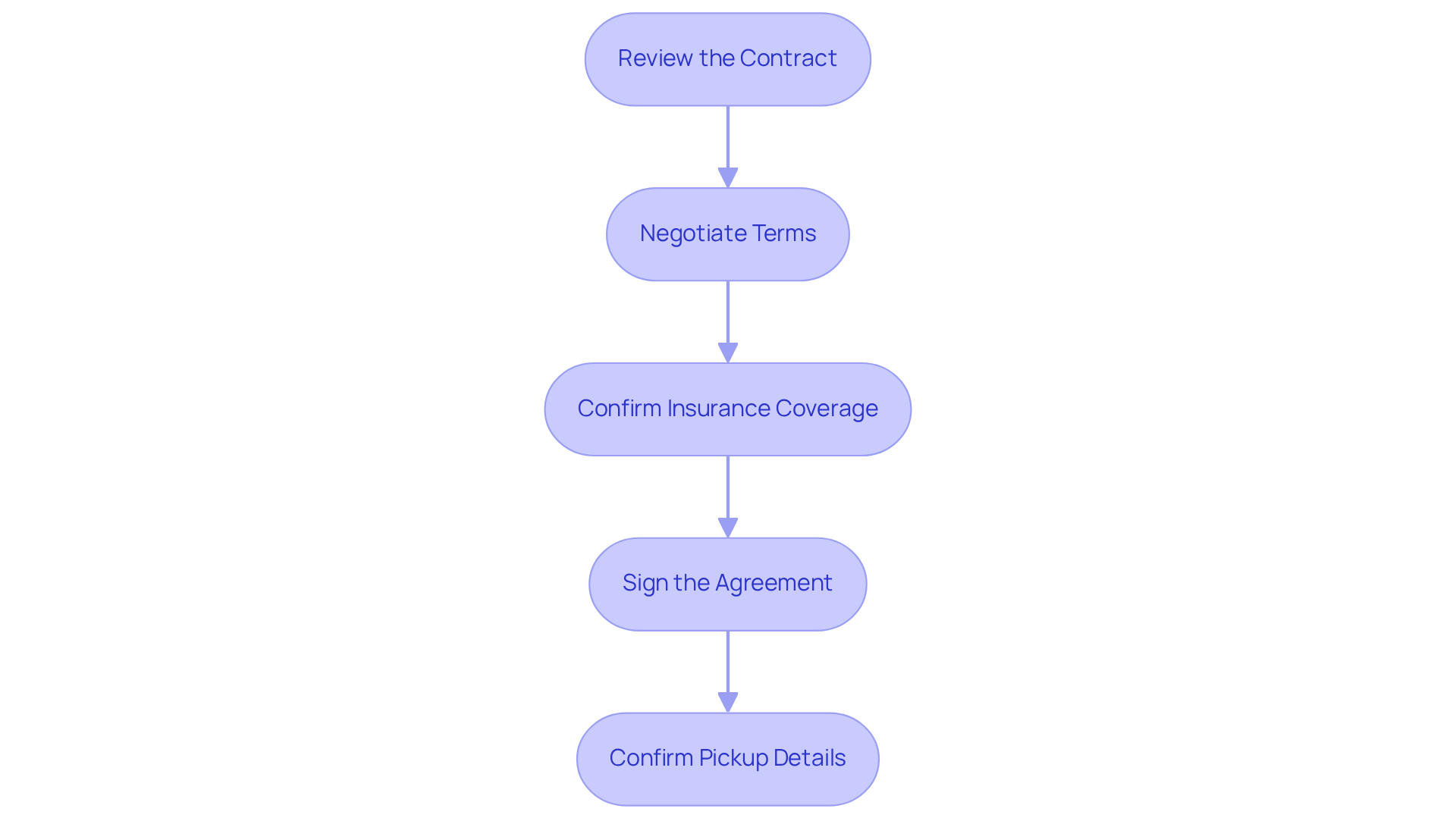Key Highlights:
- Assess project scope by identifying materials, volume, duration, and site conditions for effective equipment selection.
- Different materials have varying densities affecting vehicle load capacity; Heavy Dump Trucks can carry 15 to 40 tonnes.
- Estimate the total volume of materials to choose the appropriate vehicle size, maximising efficiency.
- Research local dump truck rental options through online searches, directories, social media, and company websites.
- Evaluate rental companies based on reputation, equipment condition, customer service, and lease conditions.
- Review rental agreements carefully, focusing on terms, costs, and insurance coverage before signing.
- Negotiate rental terms to align with project requirements and ensure clarity on penalties and conditions.
Introduction
Securing a dump truck rental with a driver can feel overwhelming, given the multitude of options and considerations at play. It's crucial to grasp the specifics of your project requirements to select the right vehicle, as this choice directly influences both efficiency and cost-effectiveness. With numerous rental companies vying for your attention, how do you pinpoint the most reliable service to fulfill your needs? This article will walk you through four straightforward steps to confidently navigate the rental process:
- Defining project specifications
- Selecting the right vehicle
- Evaluating rental companies
- Finalizing the rental agreement
Ensuring a smooth and successful operation.
Define Your Project Requirements
Begin by thoroughly assessing the scope of your project. This crucial first step sets the foundation for successful equipment selection and operational efficiency.
-
Type of Materials: Identify the materials you will be hauling, such as soil, gravel, or debris. Different substances have varying densities, which can significantly impact the load capacity of your vehicle. For instance, Heavy Dump Trucks can carry between 15 tons to 40 tons, while Medium Dump Trucks typically handle 10 to 20 cubic yards. Understanding these distinctions is vital for making informed decisions.
-
Volume of Materials: Estimate the total volume you need to transport. Standard dump vehicles usually transport around 10 to 14 cubic yards of dirt, while smaller ones may hold 1 to 6 cubic yards. Knowing the volume will help you choose the appropriate vehicle size, ensuring that you maximize efficiency.
-
Project Duration: Determine how long you will need the vehicle. Will it be for a single day, a week, or longer? This factor will influence your rental terms and costs, making it essential to clarify your timeline upfront.
-
Site Conditions: Evaluate the terrain and access points at your job site. Rough or uneven terrain may necessitate a vehicle with a lower load capacity for safe operation. Additionally, consider the vehicle's maneuverability in confined spaces, especially in urban areas. Remember, the load capacity of your vehicle is influenced by various factors, including type, body design, material density, axle configuration, and legal weight limits.
Document these requirements clearly to assist your search. This proactive approach not only enhances operational efficiency but also ensures compliance with legal weight limits and optimizes costs. By taking these steps, you position yourself to select the right equipment tailored to your project's specific needs.

Research Dump Truck Rental Options
Begin your research by employing a variety of strategies to identify reliable dump truck rental services:
-
Online Searches: Start by utilizing search engines to locate local dump truck rental companies. Customer reviews and ratings are crucial; they provide valuable insights into service quality and customer satisfaction. This initial step can significantly impact your decision-making process.
-
Local Directories: Next, explore local business directories, such as Yelp, to find reputable rental services in your area. These platforms often showcase user-generated reviews that assist in assessing the reliability of various businesses. By leveraging these resources, you can narrow down your options effectively.
-
Social Media and Forums: In addition, engage with community groups on platforms like Facebook or Reddit. These forums serve as excellent resources for gathering recommendations and firsthand experiences from other users who have used dump truck rental with driver services. Real-life testimonials can guide you toward trustworthy services.
-
Visit Leasing Websites: Finally, take the time to explore the websites of potential providers. This will enable you to see their inventory, pricing structures, and leasing terms. Compile a list of options that align with your project requirements, ensuring you have a range of choices to consider. By following these steps, you position yourself to make an informed decision that meets your needs.

Evaluate Rental Companies for Quality and Reliability
When evaluating rental companies for dump truck rental with driver, it’s crucial to consider several key factors that can significantly impact your project’s success.
-
Reputation is paramount. Look for companies with strong positive reviews and testimonials. Platforms like Google and Yelp offer valuable insights into customer satisfaction and service quality. Positive feedback regarding equipment reliability and service quality can guide you toward the best rental partners. At EZ Equipment Rental, our commitment to excellence and customer satisfaction positions us as a top choice in the Dallas-Fort Worth area.
-
Next, consider the Equipment Condition. Inquire about the maintenance history of their loading vehicles. Well-maintained vehicles are far less likely to break down, saving you time and money on your project. As industry leaders emphasize, "A well-documented maintenance history is crucial for ensuring equipment reliability." At EZ Equipment Rental, we provide an extensive selection of well-maintained machinery, ensuring you have reliable equipment for your projects, including dump truck rental with driver, skid steers, and forklifts.
-
Customer Service is another vital factor. Assess the company’s responsiveness and willingness to address your inquiries. Dependable customer service often indicates a reliable provider. Our knowledgeable team at EZ Equipment Rental is dedicated to assisting you every step of the way, offering personalized recommendations tailored to your specific needs and budget.
-
Don’t overlook the Lease Conditions. Carefully review leasing agreements to ensure clarity on pricing, insurance, and liability. Be vigilant for any hidden fees that could impact your budget. With flexible leasing terms and competitive pricing, EZ Equipment Rental makes it easy for you to access the equipment you need without breaking the bank.
-
Furthermore, consider the average upkeep expenses for cargo vehicles in leasing fleets, which typically range from $0.12 to $0.15 per mile for heavy-duty units. Understanding these costs can help you make informed decisions regarding your leasing options. By prioritizing these factors, including the importance of inspecting equipment condition before leasing, you can secure a dump truck rental with driver that effectively meets your project needs.

Finalize Rental Agreement and Terms
To finalize your rental agreement, follow these essential steps:
-
Review the Contract: Begin by thoroughly examining the rental agreement. Pay close attention to key elements such as rental duration, costs, and penalties for late returns. It's crucial that all terms are clearly defined to avoid unexpected charges.
-
Negotiate Terms: Don’t hesitate to negotiate terms that align with your project requirements. This could involve modifications to lease duration, pricing, or specific conditions that accommodate your operational needs. Effective negotiation can lead to more favorable terms and potentially significant cost savings.
-
Confirm Insurance Coverage: Verify that you have sufficient insurance coverage for the duration of the lease. Determine whether the leasing service provides insurance or if you need to obtain your own. Statistics indicate that nearly every leasing service will require proof of insurance before releasing equipment, underscoring the importance of this step.
-
Sign the Agreement: Once you are satisfied with the terms, sign the agreement and retain a copy for your records. This document serves as a binding contract that outlines your responsibilities and the rental company's obligations.
Finally, confirm the pickup details and any specific instructions regarding the operation and maintenance of the dump truck. Review the usage guidelines in the agreement that specify required qualifications and prohibited uses or locations. Additionally, be aware that cancellation without penalty is often allowed with 24-48 hours' notice, providing flexibility in your planning.

Conclusion
Securing a dump truck rental with a driver is not just a task; it’s a strategic move that can significantly impact your project’s success. By clearly defining your project requirements, you set the stage for informed decisions that align perfectly with your needs.
This guide has outlined critical steps essential for a seamless rental experience. From assessing your project’s scope to researching rental options, evaluating company reliability, and finalizing agreements, each stage is vital in selecting the right dump truck and driver. Remember, factors like equipment condition, customer service, and lease terms are not just details; they are essential considerations that can make or break your project.
In conclusion, investing time in thorough preparation and research can dramatically enhance your dump truck rental experience. Whether you’re overseeing a construction site or managing a landscaping project, following these steps ensures you find the best rental options while steering clear of potential pitfalls. Embrace this proactive approach to secure a reliable dump truck rental that meets your project’s demands and sets the stage for success. Don’t wait - take action now to ensure your project runs smoothly and efficiently.
Frequently Asked Questions
What is the first step in selecting the right equipment for a project?
The first step is to thoroughly assess the scope of your project, which sets the foundation for successful equipment selection and operational efficiency.
Why is it important to identify the type of materials being hauled?
Different materials, such as soil, gravel, or debris, have varying densities that can significantly impact the load capacity of your vehicle. Understanding these distinctions helps in making informed decisions regarding equipment selection.
What is the load capacity range for Heavy Dump Trucks?
Heavy Dump Trucks can carry between 15 tons to 40 tons.
How much volume can standard dump vehicles typically transport?
Standard dump vehicles usually transport around 10 to 14 cubic yards of dirt, while smaller ones may hold 1 to 6 cubic yards.
How does the project duration affect equipment selection?
The length of time you need the vehicle-whether for a single day, a week, or longer-will influence your rental terms and costs, making it essential to clarify your timeline upfront.
What site conditions should be evaluated before selecting a vehicle?
Evaluate the terrain and access points at your job site, as rough or uneven terrain may require a vehicle with a lower load capacity for safe operation. Also, consider the vehicle's maneuverability in confined spaces, especially in urban areas.
What factors influence the load capacity of a vehicle?
The load capacity is influenced by various factors, including the type of vehicle, body design, material density, axle configuration, and legal weight limits.
Why is it important to document project requirements?
Documenting requirements clearly assists in the search for the right equipment, enhances operational efficiency, ensures compliance with legal weight limits, and optimizes costs.




